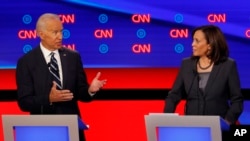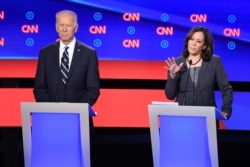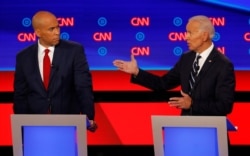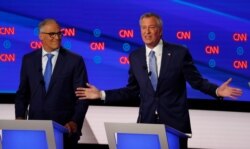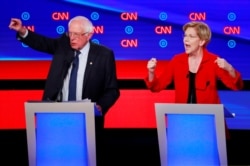Updated Aug. 1, 2019, 4:54 a.m.
WASHINGTON — Former U.S. Vice President Joe Biden clashed with Democratic presidential rivals Wednesday night on health care, immigration, crime and race as his challengers attempted to knock him off his perch as the leading Democrat to oppose President Donald Trump in the 2020 election.
“I’m running for president to restore the soul of the country,” Biden declared at the opening of a second night of Democratic candidate debates on a theater stage in the Midwest industrial hub of Detroit, Michigan.
But as soon as Biden said he thought a health care plan offered this week by California Sen. Kamala Harris was “confusing,” Harris, standing alongside Biden, retorted, “He’s probably confused because he hasn’t read it.”
Biden objected to variations of a national government-run health care system favored by Harris and some other leading Democratic contenders, instead supporting improvements in the Affordable Care Act, also known as Obamacare, the country’s health care system approved in 2010 while he served as former President Barack Obama’s second in command.
Health care discussion
Biden contended the Harris plan “will cost $3 trillion (and) you will lose your employer-based insurance,” the system that now covers 150 million Americans at their workplace. “You can’t beat President Trump with double-talk on this plan.”
Harris contended that Biden’s claims on her proposal were “simply inaccurate,” adding that the cost of doing nothing is far too expensive. “We must act.”
Biden faltered in the first debate a month ago in Miami, seemingly uncertain how to effectively rebut a challenge from Harris about his opposition 40 years ago to forced busing to racially desegregate public schools, which Harris said, as a black girl, had allowed her to attend a better school while growing up in California. They confronted each other again Tuesday on the same issue, with Harris saying, “He still hasn’t admitted he was wrong.”
Standing on the opposite side of Biden, Sen. Cory Booker, an African American former mayor of Newark, New Jersey, assailed Biden’s support in 1994 for get-tough-on-crime legislation that led to the disproportionate imprisonment of black defendants.
Biden recently offered a new criminal justice plan, reversing key provisions of the law, such as ending the stricter sentencing for crack cocaine versus powder cocaine. But Booker assailed him for the law’s lingering effects, contending, “The house was set on fire because of your plans.”
Biden responded by attacking Booker’s performance as the Newark leader in handling rampant crime and a troubled police department.
“There was nothing done for the entire eight years he was mayor to deal with the police department,” Biden snapped.
Booker responded that Biden was on shaky ground criticizing the past performance of his rivals in light of flaws in his own record as a senator and vice president.
“Mr. Vice President, you’re dipping into the Kool-Aid and you don’t even know the flavor,” he said.
Immigration
New York Mayor Bill de Blasio attacked Biden repeatedly for refusing to say whether he had attempted to counsel Obama to end the deportation of 3 million undocumented migrants, mostly from Central America, who had crossed the U.S.-Mexican border when Obama and Biden were in power from 2009 to 2017.
Biden deflected De Blasio’s attack, saying, “I keep my recommendations private.”
Several Democratic contenders, including former U.S. housing chief Julian Castro, are calling for the end to criminal charges against migrant border crossers, instead making it a civil penalty. But Biden rejected the idea, claiming, “If you say you can just cross the border, you should be able to be sent back” to the migrants’ home countries.
Even with his front-runner status in national polls, questions remain about Biden’s standing, whether at 76 he is too old to lead the country, even though Trump is 73, and whether Democratic voters want a candidate with more progressive views than the moderate, left-of-center Biden on health care, prevention of crime, migrant immigration at the U.S.-Mexican border and other issues.
Sharper on stage
Biden appeared to be much sharper and far more aggressive in dealing with his rivals, especially with Harris and Booker, than he was during the first debate. Still, he occasionally stumbled over a word or a thought.
Several of the Democratic candidates argued for Trump’s impeachment, on allegations that as president he obstructed justice by trying to thwart special counsel Robert Mueller’s investigation into Russian meddling in the 2016 U.S. presidential election. Harris said there are “10 clear instances of obstruction of justice” committed by Trump listed in Mueller’s 448-page report on his 22-month probe, and that as a former prosecutor she had witnessed people being sent to prison for far lesser offenses.
Trump has long derided the investigation and claimed exoneration. The Democratic-controlled House Judiciary Committee is in the early stages of opening an impeachment inquiry, although the Republican-controlled Congress is all but certain to reject removing him from office even if the House of Representatives were to impeach him.
As Wednesday’s debate ended, all the candidates vowed to do their utmost to defeat Trump.
“We’ve got a predator living in the White House,” Harris contended. “They prey on people they perceive to be weak. They prey on people they perceive to be vulnerable. ... Predators are cowards.” She said Democrats have “a long rap sheet” of Trump’s perceived offenses as president, including the separation of migrant children from their parents at the southern border and putting “babies in cages.”
Biden said four years of Trump as president “will go down as an aberration,” but that Trump’s re-election would “change America in a fundamental way.”
“The America we know will no longer exist,” he said.
Winnowing the field
The two nights of debates — depending on how voters and political pundits perceive them — could help winnow the crowded field of candidates before the next debate in mid-September, when the qualifications become more stringent to reach the debate stage. The debates could also solidify the top tier of candidates, now generally accepted as Biden, Harris, Booker, and the two most liberal candidates in the race, Senators Elizabeth Warren and Bernie Sanders, who were among 10 who debated Tuesday night.
National surveys show Biden defeating the Republican Trump in hypothetical election match-ups 15 months ahead of the Nov. 3, 2020, election. But after the first debate Tuesday, Trump dismissed all the Democratic challengers looking to make him the country’s first single-term president in nearly three decades.
"If I hadn’t won the 2016 Election, we would be in a Great Recession/Depression right now," Trump said on Twitter. "The people I saw on stage last night, & you can add in Sleepy Joe, Harris, & the rest, will lead us into an economic sinkhole the likes of which we have never seen before. With me, only up!"
Others on the Wednesday debate stage included Sen. Kirsten Gillibrand of New York, Congresswoman Tulsi Gabbard of Hawaii, Washington Gov. Jay Inslee, Colorado Sen. Michael Bennet and entrepreneur Andrew Yang.
Tuesday night debate
U.S. health care was the primary topic during Tuesday night’s debate, with more moderate challengers attacking Warren, a former Harvard law professor, and Sanders, a self-described democratic socialist, the leading progressives looking to oust Trump.
Warren and Sanders have both called for a sweeping end to the country’s current health care system centered on private company insurance plans offered to 150 million workers through their employers. But moderate Democratic challengers attacked their views almost from the start of the debate and said their calls for a government-run health care system would help Trump win re-election to another four-year term.
“We don’t have to go around and be the party of subtraction and telling half the country who has private health insurance that their health insurance is illegal,” former Maryland Congressman John Delaney said. “It’s also bad policy. It’ll underfund the industry, many hospitals will close, and it’s bad politics.”
Warren, from the northeastern state of Massachusetts, and Sanders, from neighboring Vermont, are friends of long-standing and often political allies. They now are both looking for votes from the liberal wing of the Democratic Party. Both defended their position calling for a government-run health care system.
“This is not radical,” Sanders shouted at one point, noting that numerous other Western democracies already have adopted government-run systems. “I get a little tired of Democrats who are afraid of big ideas.”
Warren assailed her critics, saying, “I don’t understand why anybody goes to all the trouble of running for president of the United States just to talk about what we really can’t do and shouldn’t fight for.”
But their challengers lobbed multiple attacks at the pair, saying their proposals would, over four years or longer, upend the long-standing U.S. health care system, including government-subsidized insurance for moderate and low-income families under the Affordable Care Act, popularly known as Obamacare.
Other candidates
Also taking part Tuesday were Senator Amy Klobuchar of Minnesota, former Congressman Beto O’Rourke of Texas, Ohio Congressman Tim Ryan, former Colorado Governor John Hickenlooper, Montana Governor Steve Bullock, self-help guru Marianne Williamson and South Bend, Indiana Mayor Pete Buttigieg.
Five other Democratic candidates did not qualify for the Detroit debates, but the 20 who did had to have collected campaign donations from at least 65,000 individuals and hit a 1% threshold in at least three separate polls.
It gets tougher to appear on the stage at the third debate six weeks from now. To qualify then, candidates must have 130,000 campaign contributors and at least 2% support in four polls.
Only seven of this week’s 20 debaters have met the third debate criteria: Biden, Harris, Sanders, Warren, Buttigieg, Booker and O’Rourke.




